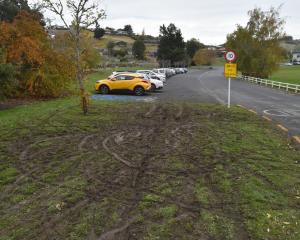SPCA Otago animal manager Grace Hepburn said two domesticated rainbow lorikeets - Dora and Steve - were at the Opoho animal shelter and needed rehoming.
''They are friendly and will sit on your shoulder.''
Steve was found in Mosgiel last Wednesday and Dora was discovered exploring South Dunedin last month. No-one had claimed either bird.
The parrots' age and sex was unknown and were ''free to a good home'' with an aviary.
The birds could not say a word but were confident squawkers, Ms Hepburn said.
Rainbow lorikeets are native to Australia and were introduced to New Zealand as cage birds.
Several rainbow lorikeets were released illegally in Auckland in the 1990s and the prolific breeders began multiplying in the wild.
The Department of Conservation began eradicating the feral population in 2000 after concerns they would compete with native birds for food and nesting sites.
A rainbow lorikeet can be kept as a caged pet but it is illegal to release one in the wild.
They are an unwanted organism under the Biosecurity Act 1993.
Ministry for Primary Industries senior adviser Brad Chandler, of the plant and environment response team, said the ministry was focused on the wild rainbow lorikeets in Auckland and were not targeting a feral flock in Otago.
If people saw a rainbow lorikeet in Otago they could call the exotic disease and pest hotline on 0800 80 99 66 and the ministry would act on ''confirmed'' reports.
The ministry got several ''false reports'' on birds mistaken for rainbow lorikeets, such as eastern rosellas.
Owners of unwanted pet parrots should take them to the SPCA for rehoming and not release them in the wild, Mr Chandler said.
Rainbow lorikeets can:
• Dominate native birds for food and nesting sites.
• Pose a threat to New Zealand's native honey-eaters, such as tui and bellbirds.
• Compete for nest sites with native birds such as kaka and kakariki.
• Damage apples, grapes and other soft fruit and pose a threat to the commercial fruit-growing industry.
• Can carry avian diseases which can threaten the health of native bird species.
Source: Department of Conservation












